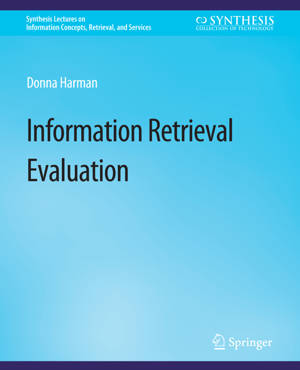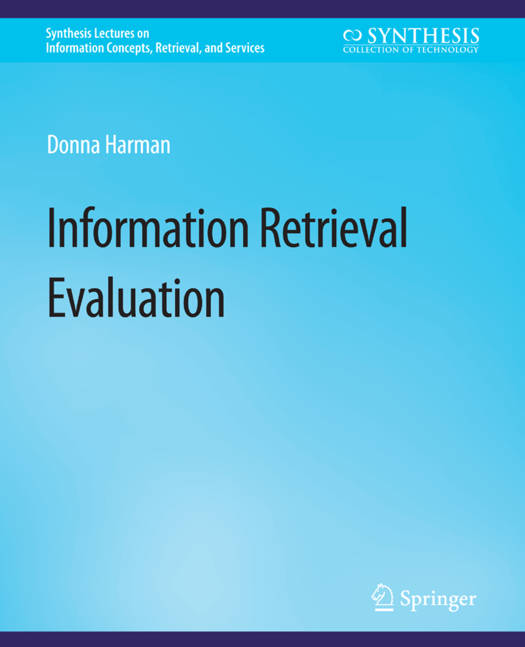
Door een staking bij bpost kan je online bestelling op dit moment iets langer onderweg zijn dan voorzien. Dringend iets nodig? Onze winkels ontvangen jou met open armen!
- Afhalen na 1 uur in een winkel met voorraad
- Gratis thuislevering in België vanaf € 30
- Ruim aanbod met 7 miljoen producten
Door een staking bij bpost kan je online bestelling op dit moment iets langer onderweg zijn dan voorzien. Dringend iets nodig? Onze winkels ontvangen jou met open armen!
- Afhalen na 1 uur in een winkel met voorraad
- Gratis thuislevering in België vanaf € 30
- Ruim aanbod met 7 miljoen producten
Zoeken
Omschrijving
Evaluation has always played a major role in information retrieval, with the early pioneers such as Cyril Cleverdon and Gerard Salton laying the foundations for most of the evaluation methodologies in use today. The retrieval community has been extremely fortunate to have such a well-grounded evaluation paradigm during a period when most of the human language technologies were just developing. This lecture has the goal of explaining where these evaluation methodologies came from and how they have continued to adapt to the vastly changed environment in the search engine world today. The lecture starts with a discussion of the early evaluation of information retrieval systems, starting with the Cranfield testing in the early 1960s, continuing with the Lancaster "user" study for MEDLARS, and presenting the various test collection investigations by the SMART project and by groups in Britain. The emphasis in this chapter is on the how and the why of the various methodologies developed. Thesecond chapter covers the more recent "batch" evaluations, examining the methodologies used in the various open evaluation campaigns such as TREC, NTCIR (emphasis on Asian languages), CLEF (emphasis on European languages), INEX (emphasis on semi-structured data), etc. Here again the focus is on the how and why, and in particular on the evolving of the older evaluation methodologies to handle new information access techniques. This includes how the test collection techniques were modified and how the metrics were changed to better reflect operational environments. The final chapters look at evaluation issues in user studies -- the interactive part of information retrieval, including a look at the search log studies mainly done by the commercial search engines. Here the goal is to show, via case studies, how the high-level issues of experimental design affect the final evaluations. Table of Contents: Introduction and Early History / "Batch" Evaluation Since 1992 / Interactive Evaluation/ Conclusion
Specificaties
Betrokkenen
- Auteur(s):
- Uitgeverij:
Inhoud
- Aantal bladzijden:
- 107
- Taal:
- Engels
- Reeks:
Eigenschappen
- Productcode (EAN):
- 9783031011481
- Verschijningsdatum:
- 6/06/2011
- Uitvoering:
- Paperback
- Formaat:
- Trade paperback (VS)
- Afmetingen:
- 191 mm x 235 mm
- Gewicht:
- 242 g

Alleen bij Standaard Boekhandel
+ 59 punten op je klantenkaart van Standaard Boekhandel
Beoordelingen
We publiceren alleen reviews die voldoen aan de voorwaarden voor reviews. Bekijk onze voorwaarden voor reviews.











